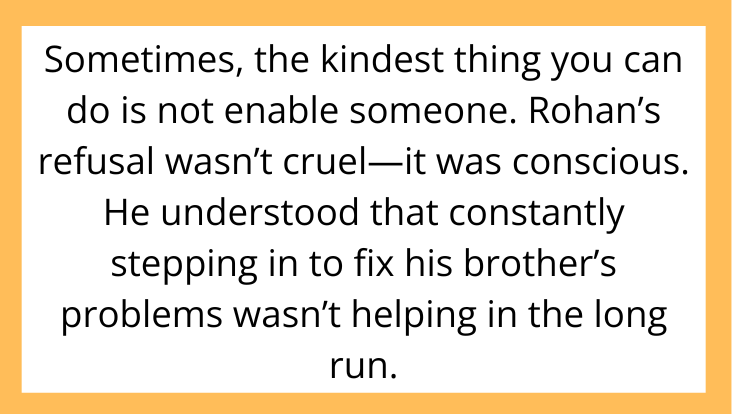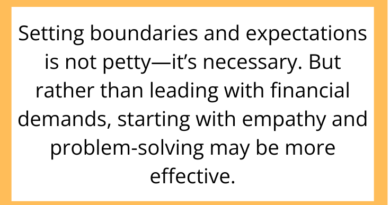AITAH for Refusing to Help My Brother Financially Even Though I Make Six Figures?
Money and family—a combination that rarely ends without tension. In today’s AITAH-inspired scenario, we explore a complicated situation where financial success leads not to celebration, but to resentment and accusations. When does “helping family” cross the line into being taken advantage of?
Let’s dive into the story of one sibling who feels guilted into generosity—and isn’t sure if they’re the villain for saying no.
The Background: From Struggle to Success

A 34-year-old professional—let’s call him Rohan—shared his story on Reddit’s AITAH community. After years of hard work, Rohan finally landed a high-paying job in tech, pulling in over $150,000 a year. He lives comfortably, has no debt, and is financially stable.
His older brother, however, hasn’t had the same luck.
Rohan’s brother, Sameer, 37, has struggled with employment, bouncing between jobs and relying on gig work to make ends meet. He’s currently behind on rent and asked Rohan for a “small loan” of $5,000 to help cover overdue bills.
Rohan refused.
The Conflict: “You’re My Brother—You Owe Me This”

Sameer didn’t take the refusal lightly. He accused Rohan of being selfish, cold, and forgetting where he came from. He reminded Rohan of the times their parents helped him with tuition and said, “If the roles were reversed, I wouldn’t hesitate to help you.”
The conversation escalated into a family-wide dispute. Rohan’s parents asked him to reconsider, saying Sameer was going through a rough patch and needed family support.
Still, Rohan stood firm. He explained that he’d helped Sameer before—covering car repairs, rent once in the past, and giving him money outright a few years ago. He felt the requests were becoming a pattern.
He turned to Reddit, asking: AITAH for refusing to help my brother financially, even though I could afford it?
Breaking It Down: Obligation vs. Boundaries

The Case for Rohan: Protecting Financial Freedom
Rohan’s point is clear: Just because he can help doesn’t mean he must. He worked hard to achieve financial stability and wants to use his money to plan for the future—buying a home, investing, maybe starting a family. Helping Sameer once or twice felt reasonable, but he fears setting a precedent.
“I’ve tried to support him in the past, but the help doesn’t lead to change,” Rohan explained. “It just delays the next crisis.”
He also pointed out something many successful earners can relate to: when you do well, people assume you have an endless supply to give.
The Case for Sameer: A Cry for Help
From Sameer’s view, family means being there when it counts. He’s struggling. He’s stressed. And watching his younger brother thrive while he’s drowning stings. To him, this isn’t about money—it’s about loyalty, compassion, and sticking together through hardship.
Sameer likely feels abandoned and ashamed. He may view Rohan’s refusal as a moral failure, not just a financial one.
What Reddit Said: A Familiar Story With Split Opinions

Reddit’s verdict leaned toward NTA (Not the Asshole), with users supporting Rohan’s right to set boundaries.
“Helping once is generous. Being expected to bankroll someone else’s life is not,” one comment read.
Another user pointed out: “You’re not an emergency fund. You’re a person.”
However, a few commenters empathized with Sameer’s desperation.
“Being broke and seeing a family member succeed can make rejection feel ten times more painful,” one user shared. “He’s hurting—but that doesn’t mean you’re wrong.”
Family and Finances: Why It’s So Complicated

Money complicates relationships. Especially in families, where emotional history blends with financial expectations. When one sibling succeeds, others may feel entitled to support—or resentful when they don’t receive it.
Here’s the hard truth: financial success often comes with invisible strings. And saying no, even for valid reasons, can be seen as betrayal.
But healthy boundaries are not betrayal. They’re necessary.
Could There Have Been a Middle Ground?

What Rohan Could Do:
-
Offer non-financial support (budget planning, job referrals).
-
Propose a structured loan agreement—with deadlines and conditions.
-
Set a clear boundary: “This is the last time I can help financially.”
What Sameer Could Consider:
-
Seek community resources, side gigs, or a financial counselor.
-
Reflect on whether he’s using guilt as a manipulation tool.
-
Understand that asking for help doesn’t guarantee receiving it.
The Real Question: Is It Kind to Say No?

Sometimes, the kindest thing you can do is not enable someone. Rohan’s refusal wasn’t cruel—it was conscious. He understood that constantly stepping in to fix his brother’s problems wasn’t helping in the long run.
And that’s what makes this AITAH story so powerful: It reminds us that kindness isn’t always about giving. Sometimes, it’s about giving space—for growth, accountability, and independence.



